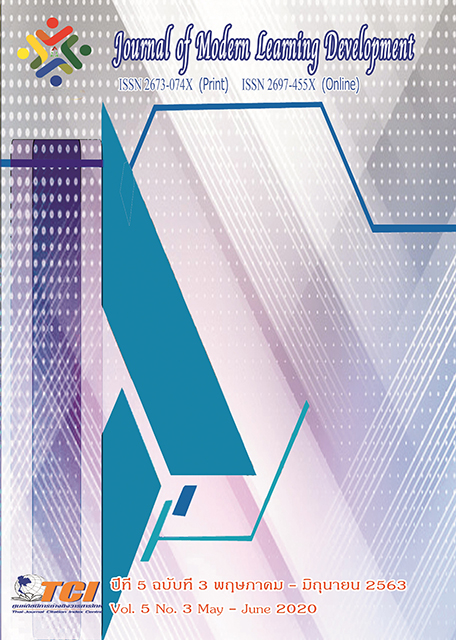Quality of Life Development of Youth in ban Nong hai Community, wapi Pathum District, Mahasarakham Province in Accordance With four Bhāvanā Dhammas
Main Article Content
Abstract
The aims of this research were: 1) to study problems of the quality of life of the youth in Ban Nong Hai community, Nong Hai Sub-district, Wapi Pathum District, Mahasarakham Province; 2) to study the principles of Four Bhāvanā Dhammas (Development) in Buddhism and 3) to study the development of the quality of life of the youth according to Four Bhāvanā Dhammas. This study was conducted by employing a qualitative research methodology to collect the data from 15 target population. The research instruments are in-depth interviews and focus group discussions. The gathered data were presented by using a descriptive analysis method.
The research results revealed that the problems of quality of life of the Nong Hai Community youth consist of 1) showing unassuming expression, 2) not behaving in accordance with the discipline and rules of the school and community, 3) feeling mentally ill, fragile, easily angry, and 4) lacking knowledge to deal with things that come to contact their Āyatana (Sensual Doors).
The principles of Four Bhāvanā Dhammas includes 1) Kāya-bhāvanā (Physical Development) which is the development of physical expression to be cautious, 2) Sīla-bhāvanā (Moral Development) that is the development of intelligent relationships with the outside world and has a relationship that is complementary to the natural and social environment, 3) Citta-bhāvanā (Emotional Development) which is to develop strength, not to be frightened, be moral and have faith and generosity and 4) Paññā-bhāvanā (Intellectual Development) that is to recognize and understand things according to reality and being aware of the changing conditions of the world and life.
After applying Four Bhāvanā Dhammas to improve the quality of life of the Nong Hai Community youth, the quality of life of the youth has improved in 4 aspects: physical aspect, youths have physical expressions with discretion, humility to the monks, teachers and adults in the community; precept aspect, the youth are responsible for their duties, behave in accordance with the discipline, rules and regulations of the school and community; mental aspect, youth have strong minds and know how to control your emotions, have volunteer spirit to help others and do good activities in the community; wisdom aspect, youth have knowledge of morality to keep up with things that make the mind bad and always have a passion for education.
Article Details
References
พระธรรมปิฎก (ป.อ.ปยุตโต). (2546). รุ่งอรุณของการศึกษา : เบิกฟ้าแห่งการพัฒนาที่ยั่งยืน/พระธรรมปิฎก (ป.อ. ปยุตฺโต). กรุงเทพมหานคร: มูลนิธิพุทธธรรม.
พระพรหมคุณาภรณ์ (ป.อ.ปยุตฺโต). (2553). ธรรมนูญชีวิตฉบับชาวบ้าน. (พิมพ์ครั้งที่ 21). กรุงเทพมหานคร: โรงพิมพ์พระพุทธศาสนาของธรรมสภา.
พระมหาบุญเพียร ปุญฺญวิริโย (แก้ววงศ์น้อย). (2544). “แนวคิดและวิธีการขัดเกลาทางสังคมในสถาบัน ครอบครัวตามแนวพระพุทธศาสนา”. วิทยานิพนธ์พุทธศาสตรมหาบัณฑิต. บัณฑิตวิทยาลัย: มหาวิทยาลัยมหา จุฬาลงกรณราชวิทยาลัย.
มหาจุฬาลงกรณราชวิทยาลัย. (2539). พระไตรปิฎกภาษาไทย ฉบับมหาจุฬาลงกรณราชวิทยาลัย. กรุงเทพมหานคร: โรงพิมพ์มหาจุฬาลงกรณราชวิทยาลัย.
อินถา ศิริวรรณ. (2550). พระพุทธศาสนากับสังคม, กรุงเทพมหานคร: สำนักพิมพ์สูตรไพศาล.


